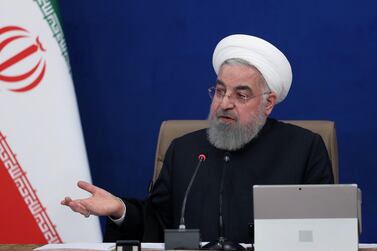The US Senate confirmed retired general Lloyd Austin as head of the Department of Defence, making him the first African American to hold the position.
Mr Austin received a swift bipartisan confirmation by the Senate on Friday, three days after his hearing. An overwhelming majority voted to confirm him to Joe Biden's Cabinet, with 93 senators voting yes and only two Republican senators, Josh Hawley and Mike Lee, voting no.
It’s an honor and a privilege to serve as our country’s 28th Secretary of Defense, and I’m especially proud to be the first African American to hold the position. Let’s get to work. pic.twitter.com/qPAzVRxz9L
— Secretary of Defense Lloyd J. Austin III (@SecDef) January 22, 2021
He is only the third retired general since 1947 to assume the position, and his confirmation required a congressional waiver to allow him to serve in a civilian capacity, having only retired from the military four years ago. Nominees are required under US law to have been out of uniform for seven years. Sixty-nine senators voted to grant the waiver, while 27 objected.
The new defence chief brings years of experience from the Middle East as the commander of US Central Command from 2013 to 2016 and the commanding general of US Forces in Iraq from 2010 to 2011, overseeing the US withdrawal from the country under the Obama administration.
That experience created a working relationship with Mr Biden who was vice president at the time, but it also exposed him to criticism for underestimating ISIS as it took Mosul under his watch in Iraq in 2014, and as the Obama administration's efforts to train a rebel force faltered in Syria.
In his hearing on Tuesday, Mr Austin made clear that his immediate priorities will be outside the Middle East, stressing that China's rise and aspiration to dominate as a global power carries more urgency.
"Clearly, the strategy will be arrayed against the threat and China presents the most significant threat going forward because China is ascending. Russia is also a threat, but it's in decline," Mr Austin said.
He urged Congress to increase resources to counter Beijing. "We'll have to have capabilities that allow us to hold – to present a credible deterrent … to China in the future. We'll have to make some strides in the use of quantum computing, the use of AI, the advent of connected battlefields, the space-based platforms. Those kinds of things I think can give us the types of capabilities that we'll need to be able to hold large pieces of Chinese military inventory at risk," he said.
Mr Austin singled out sexual assault, racism and extremism as issues he will fight hard to eliminate at the Pentagon.
“If confirmed, I will fight hard to stamp out sexual assault, to rid our ranks of racists and extremists, and to create a climate where everyone fit and willing has the opportunity to serve this country with dignity,” he said.
"The job of the Department of Defence is to keep America safe from our enemies. But we can’t do that if some of those enemies lie within our own ranks."
On threats facing the Middle East, Gen Austin pointed to the dangers of a nuclear armed Iran.
"If Iran were to get a nuclear capability, most every problem we deal with in the region would be tougher because of that. Iran’s behaviour continues to be destabilising,” he said in his hearing.
As to the Abraham Accords, which normalised relations between four Arab countries and Israel, he called it a "good thing".
“I think that any time countries agree to normalise relations, that’s a good thing. I think certainly this has put a bit more pressure on Iran and I hope it will have good effects," he said.
Mr Austin said his first phone call after being confirmed on Friday was to Nato chief Jens Stoltenberg.
"Reiterated the steadfast commitment of the US to the Nato Alliance and our appreciation for the teamwork and relevance our allies bring to missions around the world," Mr Austin said on Twitter.
Terrific to speak with @jensstoltenberg today, the first call I’ve made in the job. Reiterated the steadfast commitment of the U.S. to the @NATO Alliance and our appreciation for the teamwork and relevance our allies bring to missions around the world. #WeAreNATO https://t.co/eDi0hg5DyW pic.twitter.com/00loiA2By3
— Secretary of Defense Lloyd J. Austin III (@SecDef) January 22, 2021
He is the second Biden Cabinet appointment to be approved by Congress since the president's inauguration on Wednesday, when Avril Haines was confirmed as the new director of national intelligence by a majority from both parties.







